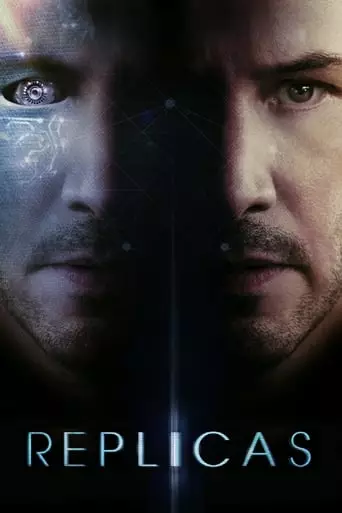A scientist becomes obsessed with returning his family to normalcy after a terrible accident.
Replicas (2018), directed by Jeffrey Nachmanoff, is a science fiction thriller that explores the ethical and emotional complexities of human consciousness transfer. The film follows neuroscientist William Foster (Keanu Reeves), who is on the verge of a groundbreaking discovery: transferring human consciousness into a computer. His ambition takes a tragic turn when his wife, Mona (Alice Eve), and their three children die in a car accident. Devastated, Foster decides to use his experimental technology to bring them back, leading to unforeseen consequences.
The narrative delves into themes of grief, the essence of identity, and the moral implications of playing God. Foster’s journey is marked by his struggle to reconcile his scientific pursuits with the profound emotional bonds he shares with his family. The film raises questions about the nature of consciousness and whether recreating a person’s mind can truly restore their essence.
Main Themes
- Grief and Loss
The film poignantly portrays the depths of grief following the loss of loved ones. Foster’s inability to accept his family’s death propels him to defy natural laws, highlighting the human desire to overcome mortality.
- Ethics of Scientific Advancement
Replicas examines the ethical boundaries of scientific experimentation. Foster’s decision to clone his family without consent raises questions about the morality of such actions and the potential consequences of unchecked scientific ambition.
- Identity and Consciousness
The film explores the concept of identity, questioning whether a cloned consciousness retains the essence of the original person. It challenges the notion of what makes us truly ourselves.
- Family and Human Connection
At its core, Replicas is about the lengths one would go to for family. It underscores the importance of human connections and the complexities involved in preserving them beyond death.
Impact of the Movie
Upon its release, Replicas received predominantly negative reviews from critics and audiences alike. The film holds a low approval rating on Rotten Tomatoes, reflecting widespread disappointment with its execution. Critics cited its predictable plot, lackluster performances, and underwhelming special effects as major drawbacks. For instance, The Guardian described it as a brain-dead sci-fi thriller, criticizing its clichéd narrative and poor CGI.
Despite its critical reception, some viewers found the film’s exploration of grief and the human desire to overcome death thought-provoking. However, these positive aspects were often overshadowed by the film’s shortcomings in storytelling and production quality.
7 Reasons to Watch Replicas (2018)
- Keanu Reeves’ Performance
Keanu Reeves delivers a compelling portrayal of a grieving father and scientist. His nuanced performance adds depth to the character, making his internal conflict palpable.
- Exploration of Grief
The film offers a raw and emotional depiction of grief, showcasing the lengths to which a person might go to cope with loss. This portrayal resonates with anyone who has experienced profound sorrow.
- Thought-Provoking Themes
Replicas delves into complex themes such as the ethics of scientific experimentation and the nature of consciousness, prompting viewers to reflect on the moral implications of technological advancements.
- Sci-Fi Enthusiast Appeal
For fans of science fiction, the film presents an intriguing premise that combines elements of cloning and artificial intelligence, offering a speculative look into future possibilities.
- Emotional Rollercoaster
The narrative takes viewers on an emotional journey, from the depths of despair to the complexities of human relationships, providing a cathartic experience.
- Moral Dilemmas
The film presents moral dilemmas that challenge viewers to consider the consequences of tampering with life and death, sparking discussions about the limits of human intervention.
- Visual Effects
While some critics have noted shortcomings in the film’s special effects, others may appreciate the attempts to visualize complex scientific concepts, adding a layer of intrigue to the narrative.
How Will You Feel After Watching Replicas (2018)?
After watching Replicas, you may experience a mix of emotions, including contemplation and perhaps frustration. The film’s exploration of grief and the human desire to overcome death is poignant, but its execution may leave you questioning the plausibility of the narrative. The ethical dilemmas presented are thought-provoking, prompting reflection on the moral boundaries of scientific advancement. However, the film’s predictable plot and underwhelming special effects might detract from its emotional impact. Overall, Replicas offers an intriguing premise but may not fully satisfy those seeking a deeply engaging science fiction experience.

